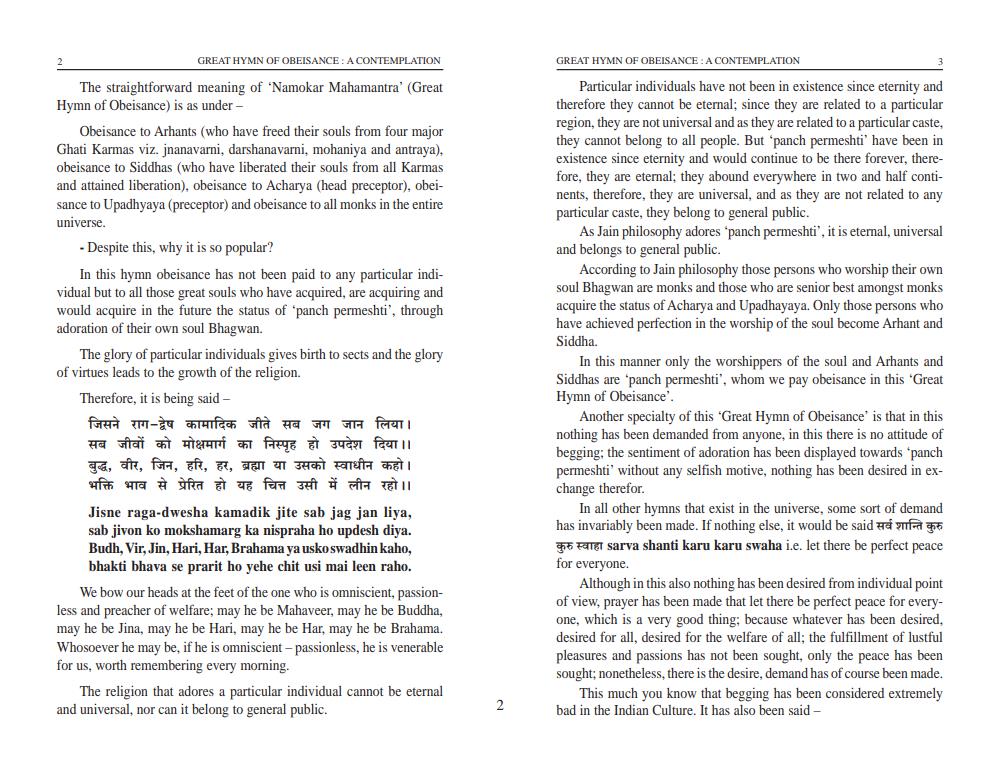Book Title: Namokar Mahamantra Ek Anushilan Author(s): Hukamchand Bharilla Publisher: Todarmal Granthamala Jaipur View full book textPage 3
________________ GREAT HYMN OF OBEISANCE: A CONTEMPLATION GREAT HYMN OF OBEISANCE: A CONTEMPLATION The straightforward meaning of 'Namokar Mahamantra' (Great Hymn of Obeisance) is as under Obeisance to Arhants (who have freed their souls from four major Ghati Karmas viz. jnanavarni, darshanavarni, mohaniya and antraya), obeisance to Siddhas (who have liberated their souls from all Karmas and attained liberation), obeisance to Acharya (head preceptor), obeisance to Upadhyaya (preceptor) and obeisance to all monks in the entire universe. - Despite this, why it is so popular? In this hymn obeisance has not been paid to any particular individual but to all those great souls who have acquired, are acquiring and would acquire in the future the status of 'panch permeshti', through adoration of their own soul Bhagwan. The glory of particular individuals gives birth to sects and the glory of virtues leads to the growth of the religion. Therefore, it is being said - जिसने राग-द्वेष कामादिक जीते सब जग जान लिया। सब जीवों को मोक्षमार्ग का निस्पृह हो उपदेश दिया ।। qa, ate, f, g, #, ET JT 341 Fateft भक्ति भाव से प्रेरित हो यह चित्त उसी में लीन रहो ।। Jisne raga-dwesha kamadik jite sab jag jan liya, sab jivon ko mokshamarg ka nispraha ho updesh diya. Budh, Vir, Jin, Hari, Har, Brahama ya usko swadhin kaho, bhakti bhava se prarit ho yehe chit usi mai leen raho. We bow our heads at the feet of the one who is omniscient, passionless and preacher of welfare; may he be Mahaveer, may he be Buddha, may he be Jina, may he be Hari, may he be Har, may he be Brahama Whosoever he may be, if he is omniscient-passionless, he is venerable for us, worth remembering every morning. The religion that adores a particular individual cannot be eternal and universal, nor can it belong to general public. Particular individuals have not been in existence since eternity and therefore they cannot be eternal; since they are related to a particular region, they are not universal and as they are related to a particular caste, they cannot belong to all people. But #panch permeshti' have been in existence since eternity and would continue to be there forever, therefore, they are eternal; they abound everywhere in two and half continents, therefore, they are universal, and as they are not related to any particular caste, they belong to general public. As Jain philosophy adores panch permeshti', it is eternal, universal and belongs to general public. According to Jain philosophy those persons who worship their own soul Bhagwan are monks and those who are senior best amongst monks acquire the status of Acharya and Upadhayaya. Only those persons who have achieved perfection in the worship of the soul become Arhant and Siddha. In this manner only the worshippers of the soul and Arhants and Siddhas are "panch permeshti', whom we pay obeisance in this 'Great Hymn of Obeisance'. Another specialty of this "Great Hymn of Obeisance is that in this nothing has been demanded from anyone, in this there is no attitude of begging: the sentiment of adoration has been displayed towards panch permeshti' without any selfish motive, nothing has been desired in exchange therefor. In all other hymns that exist in the universe, some sort of demand has invariably been made. If nothing else, it would be said yn 355 95 Fatet sarva shanti karu karu swaha i.e. let there be perfect peace for everyone. Although in this also nothing has been desired from individual point of view, prayer has been made that let there be perfect peace for everyone, which is a very good thing; because whatever has been desired, desired for all, desired for the welfare of all; the fulfillment of lustful pleasures and passions has not been sought, only the peace has been sought: nonetheless, there is the desire, demand has of course been made. This much you know that begging has been considered extremely bad in the Indian Culture. It has also been said -Page Navigation
1 2 3 4 5 6 7 8 9 10 11 12 13 14 15 16 17 18 19 20 21 22 23 24 25 26 27 28 29 30 31 32 ... 53
